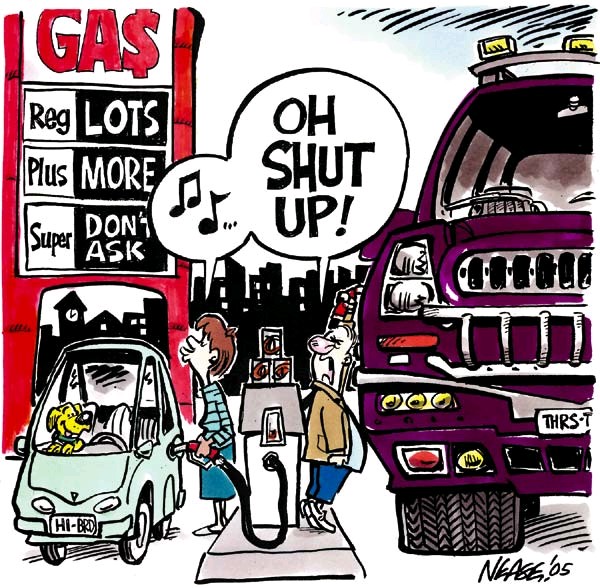$4 gas could bankrupt Big 3
 |
| Americans and their huge trucks are paying big-time at the gas pumps |
06/05/08 "Watershed moment," the cliché offered Tuesday by Ford Motor Co.'s marketing chief, Jim Farley, isn't sufficient to describe how deeply $4-a-gallon gas is gutting Detroit's automakers today and their plans for the future.
But it's a start.
General Motors Corp., its truck and SUV business evaporating at an alarming rate, says it will close four plants, boost car production at two others and green-light its plug-in Chevrolet Volt hybrid to address what Chairman Rick Wagoner calls "permanent" structural change in a U.S. vehicle market determined to do what Detroit doesn't do well — live small.
Haven't we seen this movie before, an automotive riff on an Indiana Jones sequence where the hero dodges poison darts, eludes snakes and flees the natives only to be chased by a giant boulder? The sweeping historical flourish would be to declare the past couple of months the gravest challenge to Detroit's auto industry since the oil shocks of the 1970s, but that would be wrong.
This is worse, potentially, because GM, Ford, Chrysler LLC and their United Auto Workers have fewer powerful friends, fewer loyal consumers and a lot fewer employees in fewer communities around the country. The automakers and their union also have a 30-year record of false promises, market missteps and financial boondoggles by management and labor alike that elicit proper skepticism whenever the latest Motown mea culpa essentially says, "Now we get it." [Editor's Note: Too late now]
How 'bout this: Now they don't have a choice, as their slumping market caps attest. The two cornerstones that have kept Detroit Auto from schlepping straight into federal bankruptcy court — pickups and SUVs — are crumbling with astonishing speed, hammering suppliers, dealers and anyone else with a vested interest in sourcing, building and selling those pariahs.
Geographically, Detroit isn't in the nation's hurricane zone. But economically, $4-a-gallon gas is shaping up to be the kind of once-in-a-lifetime storm that changes the course of an industry, its people and its hometown, already exhausted by wave after wave of restructuring, downsizing, give-backs and plain ol' bad news.
GM's May sales slumped a numbing (telling?) 27.5 percent, and Chrysler sales slid 25 percent. Ford, first last week to acknowledge the arrival of a New World, confirmed it again Tuesday by reporting sales down 16 percent, including a stunning 44.4 percent slide in SUVs. Toyota skidded, too. Only rivals like Honda, whose core products are not pickups and big SUVs, are the beneficiaries of anti-behemoth sentiment.
Numbers spell the new world.
Among the blizzard of talking points available to illustrate how fundamentally, how quickly, the auto biz is changing (and not in Detroit's favor) are these gems: Four car models from two Japanese players, Toyota and Honda, outsold Ford's F-Series pickups in May and, second, GM is undertaking a "strategic review" of its Hummer brand, the precondition for a corporate euthanasia that can't come soon enough.
Of all the automotive brands plying today's U.S. roads, none telegraphs American energy excess more clearly than Hummer, a cartoonish lineup whose mediocre quality never matched its robust image. That GM is issuing a death warrant for Hummer — and that Ford has unloaded its all-SUV brand, Land Rover, to the Indians — tells you how fundamentally the world has changed.
So does the fact that Japanese sedans are outselling American trucks, that Ford Focuses and Chevy Cobalts are setting sales records, that GM is planning to build a 1.4-liter engine in Flint, that $4-a-gallon gas is the new paradigm and that, by implication, the assumed American entitlement to cheap gas is dead. Detroit News
[Editor's Note: Most Americans drive around in their huge SUVs and pickup trucks by themselves the majority of the time. They like sitting up high. Makes them feel like big shots. And when they hit an econobox the impact is sometimes fatal. Meanwhile the American car companies, who made these trucks bigger each and every year, are now paying for their shortsightedness by drowning in red ink, ink so deep and so red it may end up putting them out of business.]
